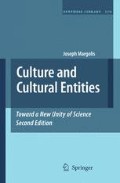Discourse about causal relations appears to be conceptually anchored in two extremely different ways; (i) relations are said to be causal if they are explainable by appeal to causal laws; and (ii) relations are said to be causal if they are instances of agency or of some process thought to be suitably similar to agency. Merely to mention these alternatives is to collect an extraordinarily large nest of puzzles of a profound sort. We are, for example, hard pressed to provide the proper account of the nature of laws, causal laws, explanations, causal explanations; also, to provide the proper account of human, animal, and inanimate agency or causal process. But apart from such strenuous matters, it may be usefully noted: (a) that it is entirely possible that appeal to so-called natural laws need not directly bear on the causal explanation of a given phenomenon simply because the laws in question need not be causal laws, laws formulating a direct causal relationship between paired phenomena (even if an underlying causal connection be presupposed); (b) that to hold that explanatory models in science are specifically causal in nature may require appeal to more than the form of laws or to the form of explanations; (c) that causal relations may, on the agency paradigm, be said to be perceived or identified (as by a successful human agent) directly and independently of reference to any causal law or causal explanation. Thus, for instance, the Boyle-Charles' law for ideal gases, is, in Ernest Nagel's opinion, “not a causal law”, primarily because it is expressed in terms of concomitant changes.1 Nagel also observes, characterizing causal laws in general, that, among qualifying conditions to be met, “the relation [involved must be] an invariable or uniform one, in the sense that whenever the alleged cause occurs so does the alleged effect”.2 Whatever weakness or vagueness may be charged to this or similar conditions (which Nagel concedes), it is reasonably clear that not all familiar laws are causal laws; it is, also, doubtful that any laws have ever been formulated that, in the relevant sense, exhibit a strict invariance; statistical laws may not be causal laws, on the condition posed; and any more rigorous formulation along these lines of what it is to be a causal law would dampen even further the likelihood of providing convincing instances. At best, to construe statistical laws as causal laws in terms of invariance requires either that such laws are no more than approximations to actual laws (which is now regarded as a doubtful or untenable thesis) or else that the variations in the regularities of their instances fall within a certain range or approach a certain limit (which is clearly not strongly favored at least in the social and behavioral sciences — and is unlikely to be, if those sciences cannot be suitably reduced to the physical and biological sciences).
Access this chapter
Tax calculation will be finalised at checkout
Purchases are for personal use only
Preview
Unable to display preview. Download preview PDF.
Editor information
Editors and Affiliations
Rights and permissions
Copyright information
© 2009 Springer-Verlag Berlin Heidelberg
About this chapter
Cite this chapter
(2009). Puzzles About the Causal Explanation of Human Actions. In: Margolis, J. (eds) Culture and Cultural Entities. Synthese Library, vol 170. Springer, Dordrecht. https://doi.org/10.1007/978-90-481-2554-8_5
Download citation
DOI: https://doi.org/10.1007/978-90-481-2554-8_5
Publisher Name: Springer, Dordrecht
Print ISBN: 978-90-481-2553-1
Online ISBN: 978-90-481-2554-8
eBook Packages: Humanities, Social Sciences and LawPhilosophy and Religion (R0)

